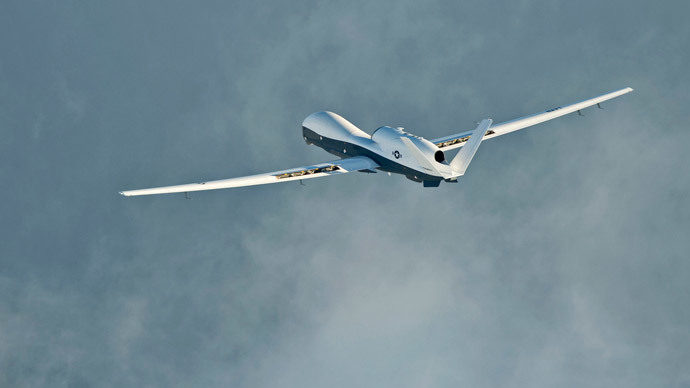Game of drones: Experts question public support for drone strikes

New polls show the US public largely approves of drone strikes overseas, but their use leads to blowback due to deaths of innocents and troubling ethical concerns that need to be addressed, experts have told RT.
A recent AP/GfK poll found that six in ten Americans favored using drones “to target and kill people belonging to terrorist groups like Al-Qaida overseas," with only 13 percent opposed and 24 percent neutral. Support among Democrats was at 60 percent and reached 72 percent among Republicans.
Marjorie Cohn, professor at the Thomas Jefferson School of Law in San Diego and author of “Drones and Targeted Killing: Legal, Moral, and Geopolitical Issues,” attributes the attitude to American exceptionalism.
READ MORE: Read More: Americans support drone strikes against terrorists – poll
“Americans are programmed to think they are better than everyone else,” Cohn told RT, noting that the media never show the results of drone strikes, making it easy for the public to believe they are precise, clinical and don’t cause civilian casualties.
“Americans are told, ‘We’re getting the bad guys, no Americans are getting killed, so naturally they are going to support [drone strikes],” Cohn said. “They don’t realize that less than 2 percent of people killed by drone strikes are high-level Al-Qaeda and Taliban leaders, and that nearly a quarter of those killed are civilians. That makes people in other countries resent us even more. It makes us even more vulnerable to terrorism.”
Amos Guiora, professor of law at the University of Utah, agrees that the media gloss over “collateral damage,” which, though a common legal term, is basically a “fancy word for the loss of life of innocent individuals.”
Neither the US nor the European public fully understands the consequences of the drone policy, Guiora said. “Perhaps in terms of explaining the term to the public it would be helpful to say that ‘collateral damage’ means, not implicitly but explicitly, that innocent individuals were killed.”
Guiora cited the accepted consensus that 12 percent of drone strikes result in the deaths of innocents.
“If that’s accurate, it strikes me as kind of high,” he said, adding that the public needs to understand what that means.
“Innocent individuals are dying, which obviously is a tragedy unto itself. But I think that also has consequences in terms of what’s called the boomerang effect,” Guiora said. “High collateral damage always has the ability of resulting in terrorist attacks by those who have been impacted.”
After years of clandestine drone use, the White House finally issued a “white paper” on the subject in 2013, but Guiora finds the broad authority asserted in the document problematic.
“I find it deeply troubling in terms of the extraordinarily wide latitude the Administration in essence gives itself,” he said.
Guiora and fellow law professor Jeffrey Brand, of the University of San Francisco, proposed creating a “drone court” last fall, calling it a “necessary restraint on executive power.”
On Tuesday’s “Politicking,” Larry King discussed the subject with Andrew Cockburn, author of “Kill Chain: The rise of the high-tech assassins.” The Washington editor for Harper’s magazine and an opinion contributor for Los Angeles Times, Cockburn has written a narrative history of drone warfare from its beginnings in WWI to plans for future weapons systems.
Though drones were first equipped with missiles during the George W. Bush era, President Barack Obama rightly deserves to be called the “drone president” for his widespread use of the remote-controlled aircraft against suspected terrorists in Afghanistan, Pakistan, Yemen and elsewhere, Cockburn told King.
Named in the 1930s by scientists who were inspired by insects, modern drones started out as scouting platforms employed by the US in the 1990s Balkans wars, Cockburn explained. The concept of missile-armed drones assassinating high-value enemy targets was born of the desire to shorten the “kill chain” during the 2003 invasion of Iraq, from 40 minutes for a conventional airstrike to mere seconds.
Presently it costs somewhere around $20,000 an hour to operate a drone and requires a support staff of almost 200 people. The US is currently the only country that operates drones worldwide, but only against tribal societies without much in the way of air defenses, Cockburn said












